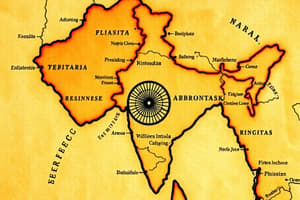Podcast
Questions and Answers
What was the significant feature of Pitt’s India Act of 1784?
What was the significant feature of Pitt’s India Act of 1784?
- Established a system of double government by creating a separate body called Board of Control for managing political affairs (correct)
- Empowered the Court of Directors to manage political affairs
- Distinguished between the administrative and military functions of the Company
- Gave supreme control to the Company over British possessions in India
What was demanded by Lord Cornwallis to accept the post of Governor-General of Bengal in 1786?
What was demanded by Lord Cornwallis to accept the post of Governor-General of Bengal in 1786?
- Power to override the decision of his council in special cases and the position of Commander-in-Chief (correct)
- Supervision and control over both commercial and political functions of the Company
- Authority to establish a separate body for managing commercial affairs and the title of Supreme Commander
- Complete autonomy in decision-making and the appointment of a Deputy Governor-General
What was significant about the Charter Act of 1793?
What was significant about the Charter Act of 1793?
- Designated the Company’s territories in India as ‘British possessions’ for the first time
- Gave authority to the Court of Directors to supervise and direct civil and military operations in India
- Established a system of dual governance by creating separate bodies for commercial and political affairs
- It granted supreme control to the British Government over Company’s affairs in India (correct)
What did Pitt’s India Act of 1784 empower the Board of Control to do?
What did Pitt’s India Act of 1784 empower the Board of Control to do?
Why was the Act of 1786 enacted?
Why was the Act of 1786 enacted?
What demand did Lord Cornwallis place to accept the post of Governor-General of Bengal?
What demand did Lord Cornwallis place to accept the post of Governor-General of Bengal?
Which Act extended the overriding power given to Lord Cornwallis over his council to all future Governor-Generals and Governors of Presidencies?
Which Act extended the overriding power given to Lord Cornwallis over his council to all future Governor-Generals and Governors of Presidencies?
Which Act allowed Christian missionaries to come to India for the purpose of enlightening the people?
Which Act allowed Christian missionaries to come to India for the purpose of enlightening the people?
Under which Act was the Governor-General of Bengal made the Governor-General of India, with authority over the entire territorial area possessed by the British in India?
Under which Act was the Governor-General of Bengal made the Governor-General of India, with authority over the entire territorial area possessed by the British in India?
Which Act ended the activities of the East India Company as a commercial body and transformed it into a purely administrative body?
Which Act ended the activities of the East India Company as a commercial body and transformed it into a purely administrative body?
Under which Act was the Indian trade thrown open to all British merchants, while continuing the monopoly of the company over trade in tea and trade with China?
Under which Act was the Indian trade thrown open to all British merchants, while continuing the monopoly of the company over trade in tea and trade with China?
Which Act vested all civil and military powers in the Governor-General of Bengal, creating a Government of India with authority over the entire territorial area possessed by the British in India?
Which Act vested all civil and military powers in the Governor-General of Bengal, creating a Government of India with authority over the entire territorial area possessed by the British in India?
Which Act attempted to introduce a system of open competition for selection of civil servants and stated that Indians should not be debarred from holding any place, office, and employment under the Company?
Which Act attempted to introduce a system of open competition for selection of civil servants and stated that Indians should not be debarred from holding any place, office, and employment under the Company?
Which Act provided that the members of the Board of Control and their staff were to be paid out of the Indian revenues?
Which Act provided that the members of the Board of Control and their staff were to be paid out of the Indian revenues?
Under which Act were the Governorship powers over Bombay and Madras reduced, giving exclusive legislative powers to the Governor-General for the entire British India?
Under which Act were the Governorship powers over Bombay and Madras reduced, giving exclusive legislative powers to the Governor-General for the entire British India?
Which act allowed Local Governments in India to impose taxes on persons and punish those who did not pay taxes?
Which act allowed Local Governments in India to impose taxes on persons and punish those who did not pay taxes?
Flashcards are hidden until you start studying
Study Notes
Pitt's India Act of 1784
- Empowered the Board of Control to oversee the East India Company's affairs and appoint the Governor-General of Bengal
- Marked a significant shift in the British government's control over the East India Company's activities in India
Lord Cornwallis' Demands
- Demanded overriding power over his council to accept the post of Governor-General of Bengal in 1786
- This demand was later extended to all future Governor-Generals and Governors of Presidencies through the Charter Act of 1793
Charter Act of 1793
- Extended the overriding power given to Lord Cornwallis over his council to all future Governor-Generals and Governors of Presidencies
- Allowed Christian missionaries to come to India for the purpose of enlightening the people
Act of 1786
- Enacted to provide Lord Cornwallis with the demanded overriding power over his council
- Marked the beginning of the British government's increased control over the East India Company's activities in India
Governor-General of India
- The Governor-General of Bengal was made the Governor-General of India, with authority over the entire territorial area possessed by the British in India, under the Charter Act of 1833
- Vested all civil and military powers in the Governor-General, creating a Government of India with authority over the entire territorial area possessed by the British in India
East India Company
- The East India Company's activities as a commercial body ended, and it was transformed into a purely administrative body, under the Act of 1858
- The Indian trade was thrown open to all British merchants, while continuing the monopoly of the company over trade in tea and trade with China, under the Act of 1813
Civil Servants and Indians
- The Act of 1853 attempted to introduce a system of open competition for selection of civil servants and stated that Indians should not be debarred from holding any place, office, and employment under the Company
Board of Control
- The members of the Board of Control and their staff were to be paid out of the Indian revenues, under the Act of 1784
Governorship Powers and Local Governments
- The Governorship powers over Bombay and Madras were reduced, giving exclusive legislative powers to the Governor-General for the entire British India, under the Act of 1833
- Local Governments in India were allowed to impose taxes on persons and punish those who did not pay taxes, under the Act of 1835
Studying That Suits You
Use AI to generate personalized quizzes and flashcards to suit your learning preferences.




